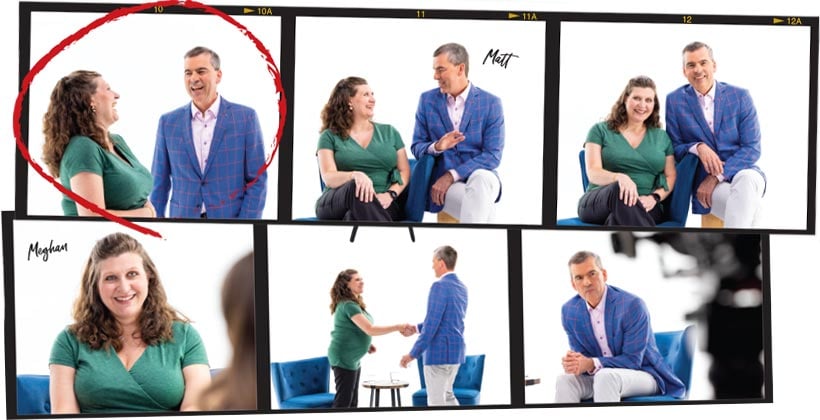Matt and Meghan
COVER STORY
NOW STREAMING: Watch “The Gratitude Sessions” at cle.clinic/GratitudeSessions | Photos: Don Gerda and Lisa DeJong
Matt and Meghan
Matt Litzler is a Cleveland Clinic donor. He supports multiple sclerosis research as well as the VeloSano cancer research initiative, in addition to serving on the Neurological Institute Advisory Committee and the VeloSano Steering Committee. He is president and CEO of a manufacturing company.
Meghan DeBenedictis is a genetic counselor. She was diagnosed with MS more than 20 years ago.
MATT: It’s so nice to meet you.
MEGHAN: You, too.
MATT: We have a number of things to talk about. I guess we can start with your health journey. So … what’s not a good day?
MEGHAN: There are some days when it’s hard to even get out of bed because my legs just don’t want to work. Each leg feels like it weighs a hundred pounds. Just getting my legs to even do what I want them to do is a challenge. I’ve had problems with my arms, my hands and my vision, but primarily with my legs.
MATT: Do you have a good support group? Family and friends?
MEGHAN: Yes. They’re phenomenal. And because of donors such as yourself, so many patients like me have benefited. I just can’t express the amount of gratitude that I feel.
MATT: I appreciate that, and I pass that back to the generations before.
When Meghan asks Matt why he specifically donates to MS research, he leans in to share some personal news: In 2020, he was diagnosed with MS.
MATT: I was just sobbing as I waited for my wife to get the car. It was horrible. Then we sprang into action. A lot of days, I forget about it — until it smacks me upside the back of the head. What advice do you have? When a day is bad, what do you do?
MEGHAN: The biggest thing that’s helped me is to accept the fact that this is a part of me. I think for a long time I tried to deny it. I didn’t want to be different from anybody else.
MATT: As we’re talking about gratitude, once I got over “Why me?” it was, “OK, now what do we do?” Now I treat the diagnosis date as a second birthday.
MEGHAN: Do you?
MATT: Yes. You just appreciate things so much more. So I’m first a grateful patient, not unlike yourself. [Matt and Meghan both receive care at Cleveland Clinic’s Mellen Center.] And I’m a grateful donor.
MEGHAN: I’m doing all the things that I wanted to do in life. I travel. I’m married. I’m having a baby. Granted, there have been times when I’ve needed assistance or had to have special accommodations, but I’ve never let MS limit me in any way.
MATT: That’s a good way to phrase it. This isn’t defining us.
MEGHAN: It’s such a sign of hope to see that there are people out there who are invested — not just financially, but also emotionally — in finding treatments and facilitating research. It’s really impactful for all patients with these diseases to know that someone’s paying attention, someone cares, someone’s willing to give so that I may be able to live a better life.
MATT: And that word, “hope,” is so important to make me believe, “I’m gonna be OK here.”
Postscript: One month after this conversation, Meghan and her husband, Billy, welcomed their first child. They named her Ava Marie.

